Southern Cross University: LAW00150 Business Law Contract Analysis
VerifiedAdded on 2023/06/12
|10
|2358
|160
Case Study
AI Summary
This case study delves into various aspects of contract law, addressing issues such as intention to be legally bound, consideration, part payment of debts, inclusion of contractual terms, exclusion clauses, and implied terms. It analyzes scenarios involving a flower shop sale between siblings, police services and consideration, part payment accompanied by additional services, unusual contractual terms in a DVD rental agreement, and the validity of exclusion clauses in a dry cleaning service. The analysis is supported by relevant case law, including Balfour v Balfour, Errington v Errington Woods, Collins v Godefrey, Glasbrook Bros v Glamorgan County Council, Pinnel’s case, Foakes v Beer, Interfoto Picture Library v Stiletto Visual Programmes, Curtis v Chemical Cleaning Co, L'Estrange V Graucob, and David Jones v Willis, to determine the legal outcomes for each scenario. The document is available on Desklib, a platform that provides students with access to a variety of study tools and resources, including past papers and solved assignments.
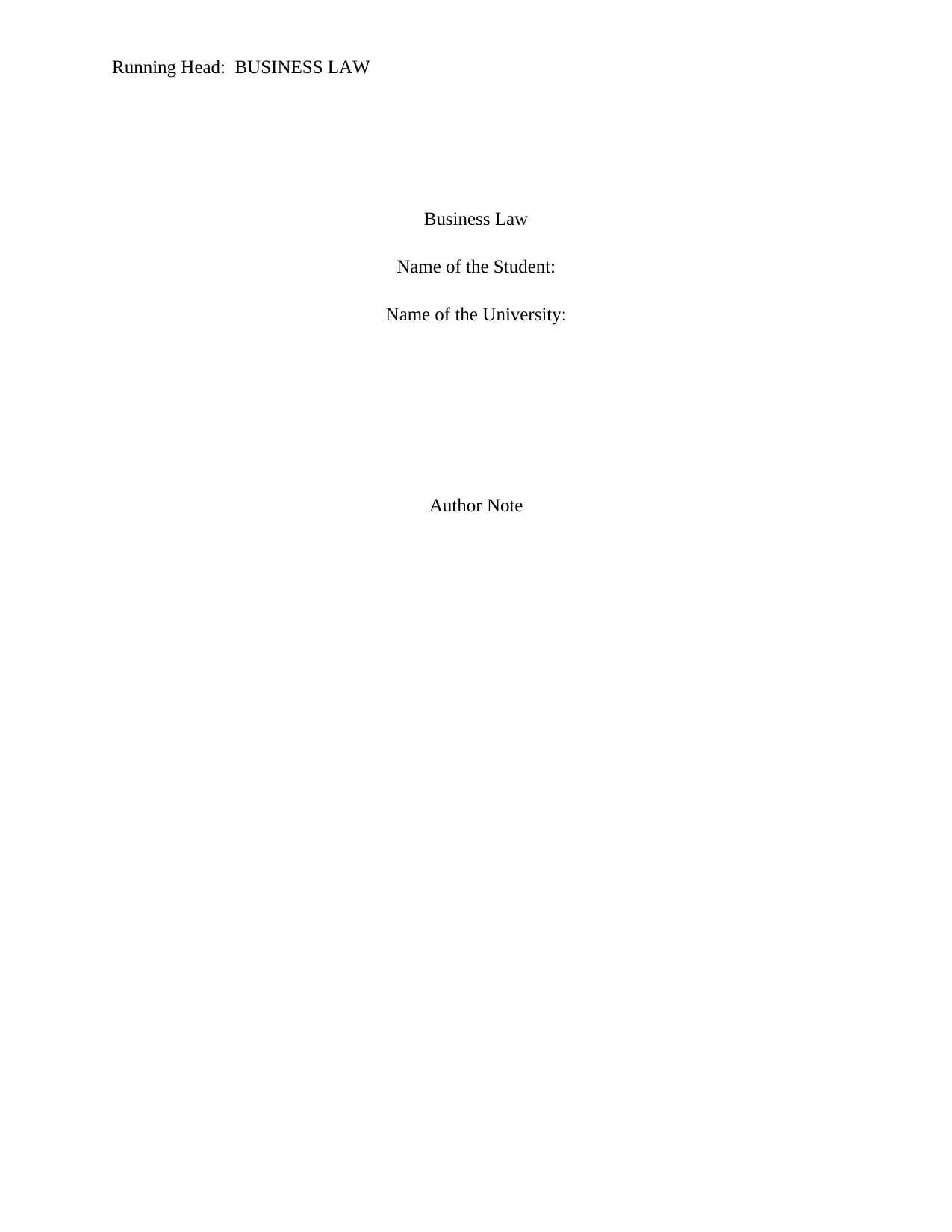
Running Head: BUSINESS LAW
Business Law
Name of the Student:
Name of the University:
Author Note
Business Law
Name of the Student:
Name of the University:
Author Note
Paraphrase This Document
Need a fresh take? Get an instant paraphrase of this document with our AI Paraphraser
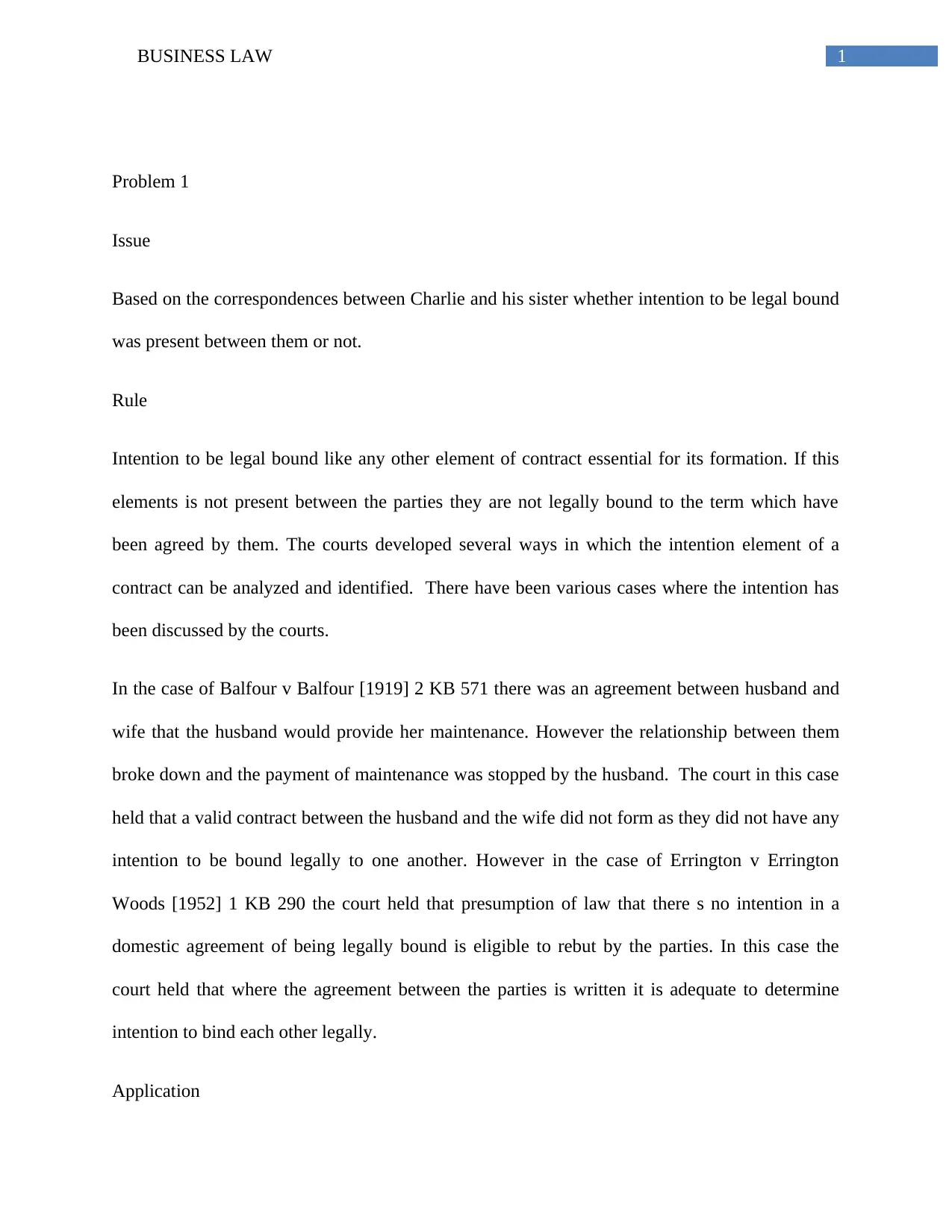
1BUSINESS LAW
Problem 1
Issue
Based on the correspondences between Charlie and his sister whether intention to be legal bound
was present between them or not.
Rule
Intention to be legal bound like any other element of contract essential for its formation. If this
elements is not present between the parties they are not legally bound to the term which have
been agreed by them. The courts developed several ways in which the intention element of a
contract can be analyzed and identified. There have been various cases where the intention has
been discussed by the courts.
In the case of Balfour v Balfour [1919] 2 KB 571 there was an agreement between husband and
wife that the husband would provide her maintenance. However the relationship between them
broke down and the payment of maintenance was stopped by the husband. The court in this case
held that a valid contract between the husband and the wife did not form as they did not have any
intention to be bound legally to one another. However in the case of Errington v Errington
Woods [1952] 1 KB 290 the court held that presumption of law that there s no intention in a
domestic agreement of being legally bound is eligible to rebut by the parties. In this case the
court held that where the agreement between the parties is written it is adequate to determine
intention to bind each other legally.
Application
Problem 1
Issue
Based on the correspondences between Charlie and his sister whether intention to be legal bound
was present between them or not.
Rule
Intention to be legal bound like any other element of contract essential for its formation. If this
elements is not present between the parties they are not legally bound to the term which have
been agreed by them. The courts developed several ways in which the intention element of a
contract can be analyzed and identified. There have been various cases where the intention has
been discussed by the courts.
In the case of Balfour v Balfour [1919] 2 KB 571 there was an agreement between husband and
wife that the husband would provide her maintenance. However the relationship between them
broke down and the payment of maintenance was stopped by the husband. The court in this case
held that a valid contract between the husband and the wife did not form as they did not have any
intention to be bound legally to one another. However in the case of Errington v Errington
Woods [1952] 1 KB 290 the court held that presumption of law that there s no intention in a
domestic agreement of being legally bound is eligible to rebut by the parties. In this case the
court held that where the agreement between the parties is written it is adequate to determine
intention to bind each other legally.
Application
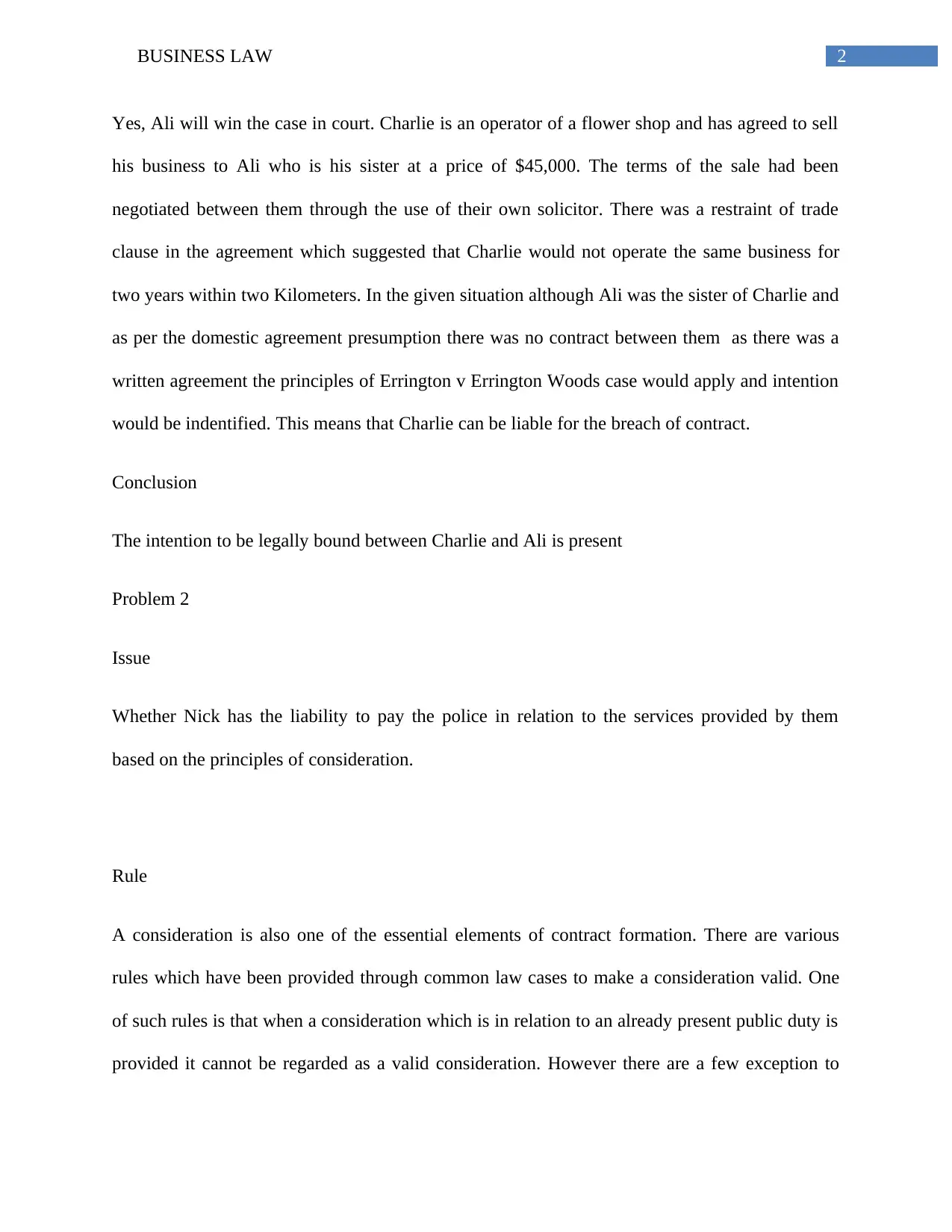
2BUSINESS LAW
Yes, Ali will win the case in court. Charlie is an operator of a flower shop and has agreed to sell
his business to Ali who is his sister at a price of $45,000. The terms of the sale had been
negotiated between them through the use of their own solicitor. There was a restraint of trade
clause in the agreement which suggested that Charlie would not operate the same business for
two years within two Kilometers. In the given situation although Ali was the sister of Charlie and
as per the domestic agreement presumption there was no contract between them as there was a
written agreement the principles of Errington v Errington Woods case would apply and intention
would be indentified. This means that Charlie can be liable for the breach of contract.
Conclusion
The intention to be legally bound between Charlie and Ali is present
Problem 2
Issue
Whether Nick has the liability to pay the police in relation to the services provided by them
based on the principles of consideration.
Rule
A consideration is also one of the essential elements of contract formation. There are various
rules which have been provided through common law cases to make a consideration valid. One
of such rules is that when a consideration which is in relation to an already present public duty is
provided it cannot be regarded as a valid consideration. However there are a few exception to
Yes, Ali will win the case in court. Charlie is an operator of a flower shop and has agreed to sell
his business to Ali who is his sister at a price of $45,000. The terms of the sale had been
negotiated between them through the use of their own solicitor. There was a restraint of trade
clause in the agreement which suggested that Charlie would not operate the same business for
two years within two Kilometers. In the given situation although Ali was the sister of Charlie and
as per the domestic agreement presumption there was no contract between them as there was a
written agreement the principles of Errington v Errington Woods case would apply and intention
would be indentified. This means that Charlie can be liable for the breach of contract.
Conclusion
The intention to be legally bound between Charlie and Ali is present
Problem 2
Issue
Whether Nick has the liability to pay the police in relation to the services provided by them
based on the principles of consideration.
Rule
A consideration is also one of the essential elements of contract formation. There are various
rules which have been provided through common law cases to make a consideration valid. One
of such rules is that when a consideration which is in relation to an already present public duty is
provided it cannot be regarded as a valid consideration. However there are a few exception to
⊘ This is a preview!⊘
Do you want full access?
Subscribe today to unlock all pages.

Trusted by 1+ million students worldwide
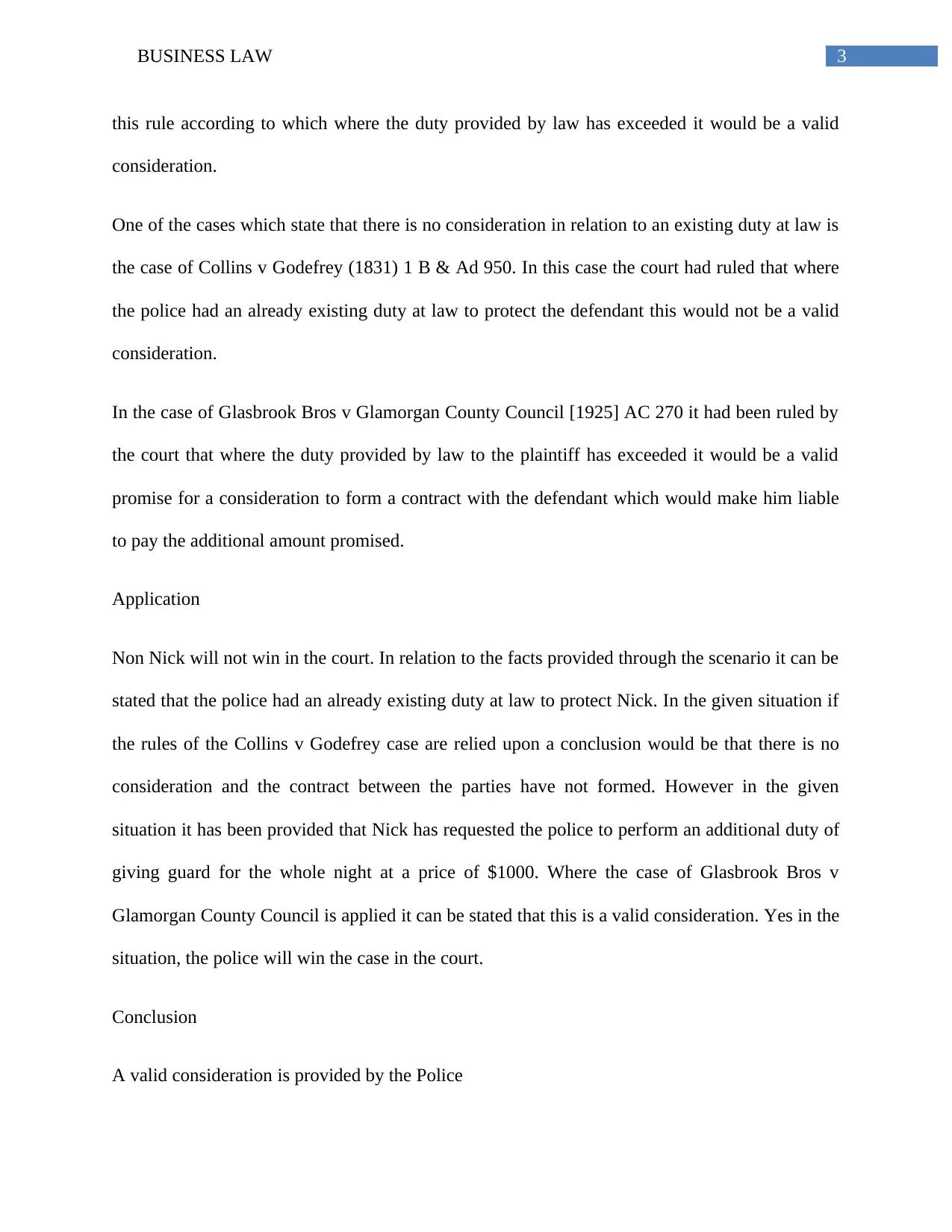
3BUSINESS LAW
this rule according to which where the duty provided by law has exceeded it would be a valid
consideration.
One of the cases which state that there is no consideration in relation to an existing duty at law is
the case of Collins v Godefrey (1831) 1 B & Ad 950. In this case the court had ruled that where
the police had an already existing duty at law to protect the defendant this would not be a valid
consideration.
In the case of Glasbrook Bros v Glamorgan County Council [1925] AC 270 it had been ruled by
the court that where the duty provided by law to the plaintiff has exceeded it would be a valid
promise for a consideration to form a contract with the defendant which would make him liable
to pay the additional amount promised.
Application
Non Nick will not win in the court. In relation to the facts provided through the scenario it can be
stated that the police had an already existing duty at law to protect Nick. In the given situation if
the rules of the Collins v Godefrey case are relied upon a conclusion would be that there is no
consideration and the contract between the parties have not formed. However in the given
situation it has been provided that Nick has requested the police to perform an additional duty of
giving guard for the whole night at a price of $1000. Where the case of Glasbrook Bros v
Glamorgan County Council is applied it can be stated that this is a valid consideration. Yes in the
situation, the police will win the case in the court.
Conclusion
A valid consideration is provided by the Police
this rule according to which where the duty provided by law has exceeded it would be a valid
consideration.
One of the cases which state that there is no consideration in relation to an existing duty at law is
the case of Collins v Godefrey (1831) 1 B & Ad 950. In this case the court had ruled that where
the police had an already existing duty at law to protect the defendant this would not be a valid
consideration.
In the case of Glasbrook Bros v Glamorgan County Council [1925] AC 270 it had been ruled by
the court that where the duty provided by law to the plaintiff has exceeded it would be a valid
promise for a consideration to form a contract with the defendant which would make him liable
to pay the additional amount promised.
Application
Non Nick will not win in the court. In relation to the facts provided through the scenario it can be
stated that the police had an already existing duty at law to protect Nick. In the given situation if
the rules of the Collins v Godefrey case are relied upon a conclusion would be that there is no
consideration and the contract between the parties have not formed. However in the given
situation it has been provided that Nick has requested the police to perform an additional duty of
giving guard for the whole night at a price of $1000. Where the case of Glasbrook Bros v
Glamorgan County Council is applied it can be stated that this is a valid consideration. Yes in the
situation, the police will win the case in the court.
Conclusion
A valid consideration is provided by the Police
Paraphrase This Document
Need a fresh take? Get an instant paraphrase of this document with our AI Paraphraser
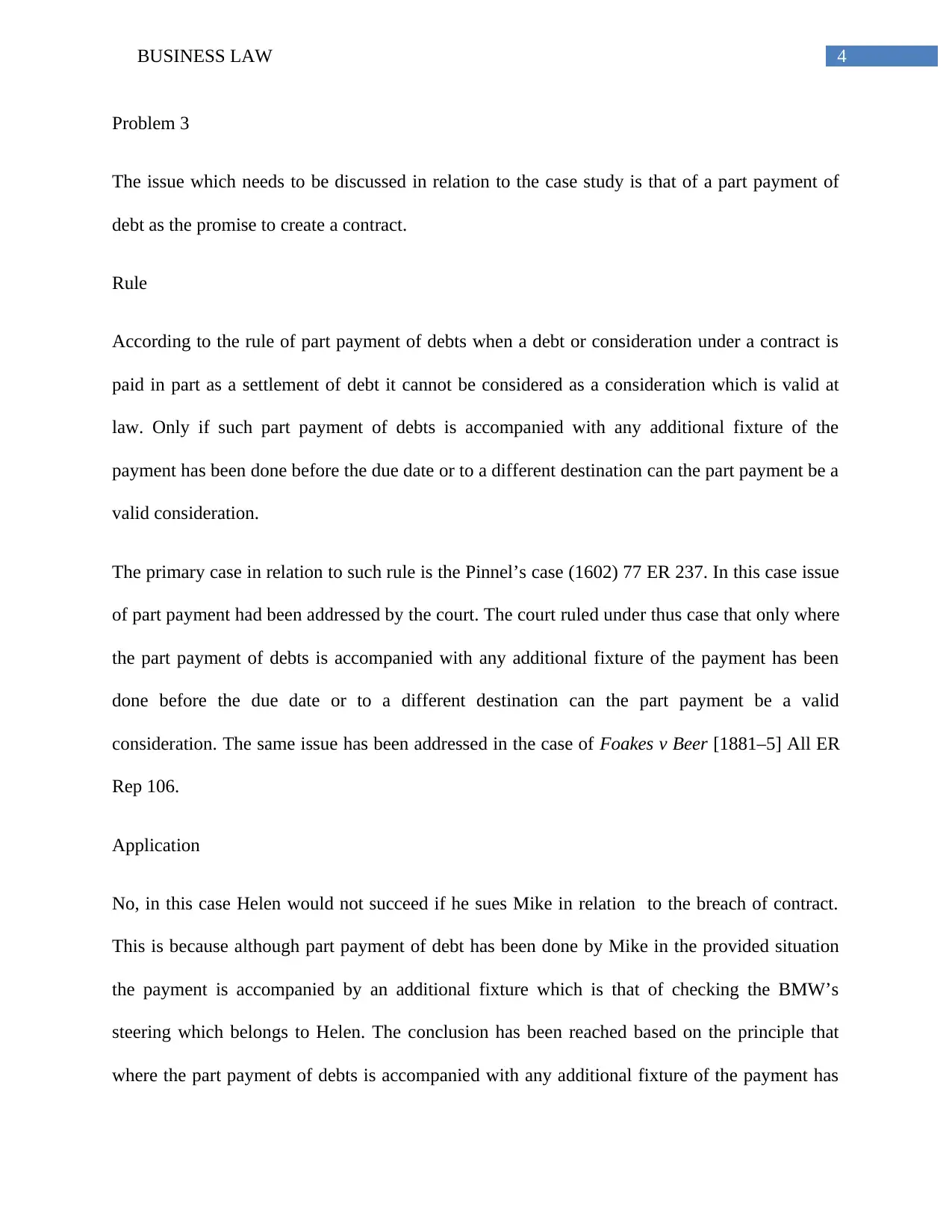
4BUSINESS LAW
Problem 3
The issue which needs to be discussed in relation to the case study is that of a part payment of
debt as the promise to create a contract.
Rule
According to the rule of part payment of debts when a debt or consideration under a contract is
paid in part as a settlement of debt it cannot be considered as a consideration which is valid at
law. Only if such part payment of debts is accompanied with any additional fixture of the
payment has been done before the due date or to a different destination can the part payment be a
valid consideration.
The primary case in relation to such rule is the Pinnel’s case (1602) 77 ER 237. In this case issue
of part payment had been addressed by the court. The court ruled under thus case that only where
the part payment of debts is accompanied with any additional fixture of the payment has been
done before the due date or to a different destination can the part payment be a valid
consideration. The same issue has been addressed in the case of Foakes v Beer [1881–5] All ER
Rep 106.
Application
No, in this case Helen would not succeed if he sues Mike in relation to the breach of contract.
This is because although part payment of debt has been done by Mike in the provided situation
the payment is accompanied by an additional fixture which is that of checking the BMW’s
steering which belongs to Helen. The conclusion has been reached based on the principle that
where the part payment of debts is accompanied with any additional fixture of the payment has
Problem 3
The issue which needs to be discussed in relation to the case study is that of a part payment of
debt as the promise to create a contract.
Rule
According to the rule of part payment of debts when a debt or consideration under a contract is
paid in part as a settlement of debt it cannot be considered as a consideration which is valid at
law. Only if such part payment of debts is accompanied with any additional fixture of the
payment has been done before the due date or to a different destination can the part payment be a
valid consideration.
The primary case in relation to such rule is the Pinnel’s case (1602) 77 ER 237. In this case issue
of part payment had been addressed by the court. The court ruled under thus case that only where
the part payment of debts is accompanied with any additional fixture of the payment has been
done before the due date or to a different destination can the part payment be a valid
consideration. The same issue has been addressed in the case of Foakes v Beer [1881–5] All ER
Rep 106.
Application
No, in this case Helen would not succeed if he sues Mike in relation to the breach of contract.
This is because although part payment of debt has been done by Mike in the provided situation
the payment is accompanied by an additional fixture which is that of checking the BMW’s
steering which belongs to Helen. The conclusion has been reached based on the principle that
where the part payment of debts is accompanied with any additional fixture of the payment has
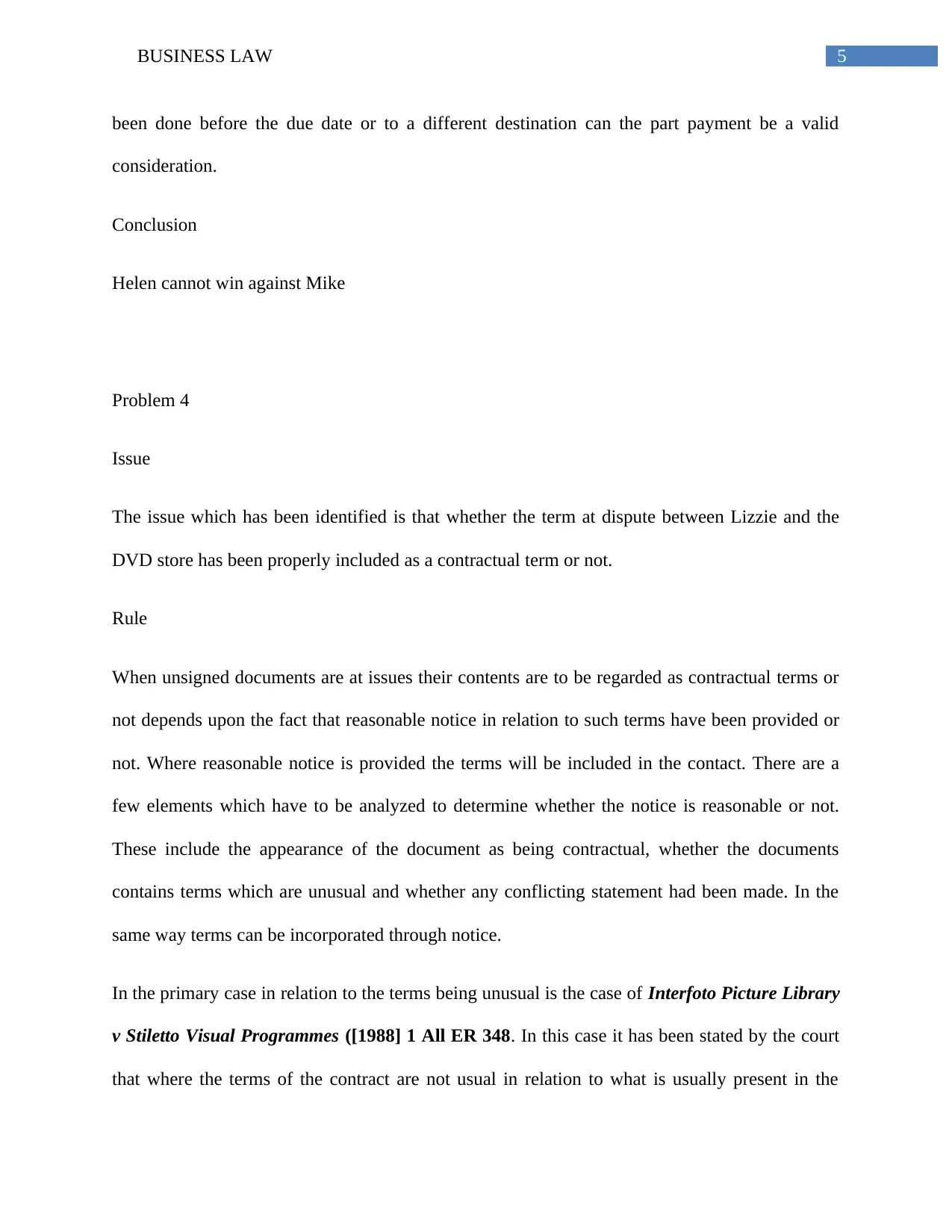
5BUSINESS LAW
been done before the due date or to a different destination can the part payment be a valid
consideration.
Conclusion
Helen cannot win against Mike
Problem 4
Issue
The issue which has been identified is that whether the term at dispute between Lizzie and the
DVD store has been properly included as a contractual term or not.
Rule
When unsigned documents are at issues their contents are to be regarded as contractual terms or
not depends upon the fact that reasonable notice in relation to such terms have been provided or
not. Where reasonable notice is provided the terms will be included in the contact. There are a
few elements which have to be analyzed to determine whether the notice is reasonable or not.
These include the appearance of the document as being contractual, whether the documents
contains terms which are unusual and whether any conflicting statement had been made. In the
same way terms can be incorporated through notice.
In the primary case in relation to the terms being unusual is the case of Interfoto Picture Library
v Stiletto Visual Programmes ([1988] 1 All ER 348. In this case it has been stated by the court
that where the terms of the contract are not usual in relation to what is usually present in the
been done before the due date or to a different destination can the part payment be a valid
consideration.
Conclusion
Helen cannot win against Mike
Problem 4
Issue
The issue which has been identified is that whether the term at dispute between Lizzie and the
DVD store has been properly included as a contractual term or not.
Rule
When unsigned documents are at issues their contents are to be regarded as contractual terms or
not depends upon the fact that reasonable notice in relation to such terms have been provided or
not. Where reasonable notice is provided the terms will be included in the contact. There are a
few elements which have to be analyzed to determine whether the notice is reasonable or not.
These include the appearance of the document as being contractual, whether the documents
contains terms which are unusual and whether any conflicting statement had been made. In the
same way terms can be incorporated through notice.
In the primary case in relation to the terms being unusual is the case of Interfoto Picture Library
v Stiletto Visual Programmes ([1988] 1 All ER 348. In this case it has been stated by the court
that where the terms of the contract are not usual in relation to what is usually present in the
⊘ This is a preview!⊘
Do you want full access?
Subscribe today to unlock all pages.

Trusted by 1+ million students worldwide
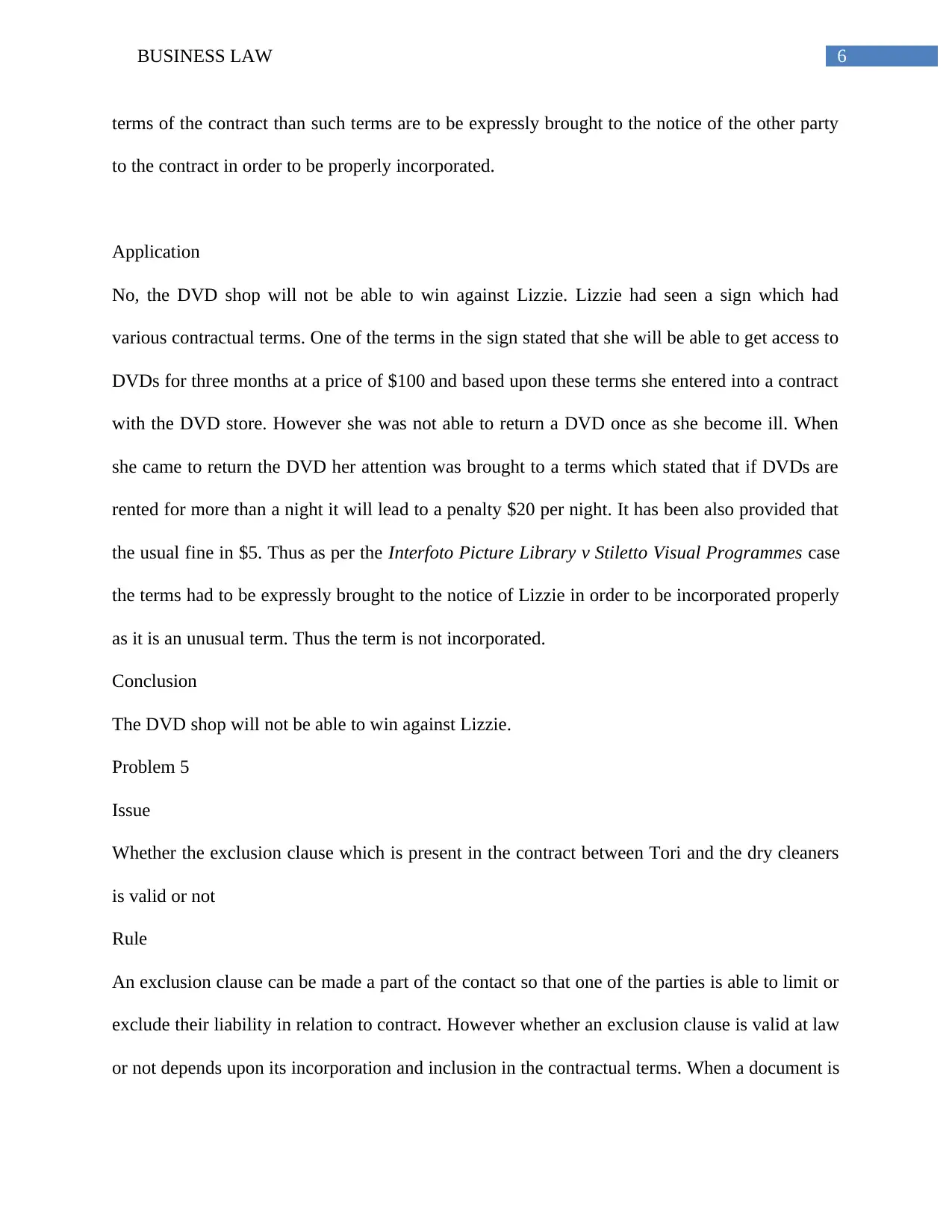
6BUSINESS LAW
terms of the contract than such terms are to be expressly brought to the notice of the other party
to the contract in order to be properly incorporated.
Application
No, the DVD shop will not be able to win against Lizzie. Lizzie had seen a sign which had
various contractual terms. One of the terms in the sign stated that she will be able to get access to
DVDs for three months at a price of $100 and based upon these terms she entered into a contract
with the DVD store. However she was not able to return a DVD once as she become ill. When
she came to return the DVD her attention was brought to a terms which stated that if DVDs are
rented for more than a night it will lead to a penalty $20 per night. It has been also provided that
the usual fine in $5. Thus as per the Interfoto Picture Library v Stiletto Visual Programmes case
the terms had to be expressly brought to the notice of Lizzie in order to be incorporated properly
as it is an unusual term. Thus the term is not incorporated.
Conclusion
The DVD shop will not be able to win against Lizzie.
Problem 5
Issue
Whether the exclusion clause which is present in the contract between Tori and the dry cleaners
is valid or not
Rule
An exclusion clause can be made a part of the contact so that one of the parties is able to limit or
exclude their liability in relation to contract. However whether an exclusion clause is valid at law
or not depends upon its incorporation and inclusion in the contractual terms. When a document is
terms of the contract than such terms are to be expressly brought to the notice of the other party
to the contract in order to be properly incorporated.
Application
No, the DVD shop will not be able to win against Lizzie. Lizzie had seen a sign which had
various contractual terms. One of the terms in the sign stated that she will be able to get access to
DVDs for three months at a price of $100 and based upon these terms she entered into a contract
with the DVD store. However she was not able to return a DVD once as she become ill. When
she came to return the DVD her attention was brought to a terms which stated that if DVDs are
rented for more than a night it will lead to a penalty $20 per night. It has been also provided that
the usual fine in $5. Thus as per the Interfoto Picture Library v Stiletto Visual Programmes case
the terms had to be expressly brought to the notice of Lizzie in order to be incorporated properly
as it is an unusual term. Thus the term is not incorporated.
Conclusion
The DVD shop will not be able to win against Lizzie.
Problem 5
Issue
Whether the exclusion clause which is present in the contract between Tori and the dry cleaners
is valid or not
Rule
An exclusion clause can be made a part of the contact so that one of the parties is able to limit or
exclude their liability in relation to contract. However whether an exclusion clause is valid at law
or not depends upon its incorporation and inclusion in the contractual terms. When a document is
Paraphrase This Document
Need a fresh take? Get an instant paraphrase of this document with our AI Paraphraser
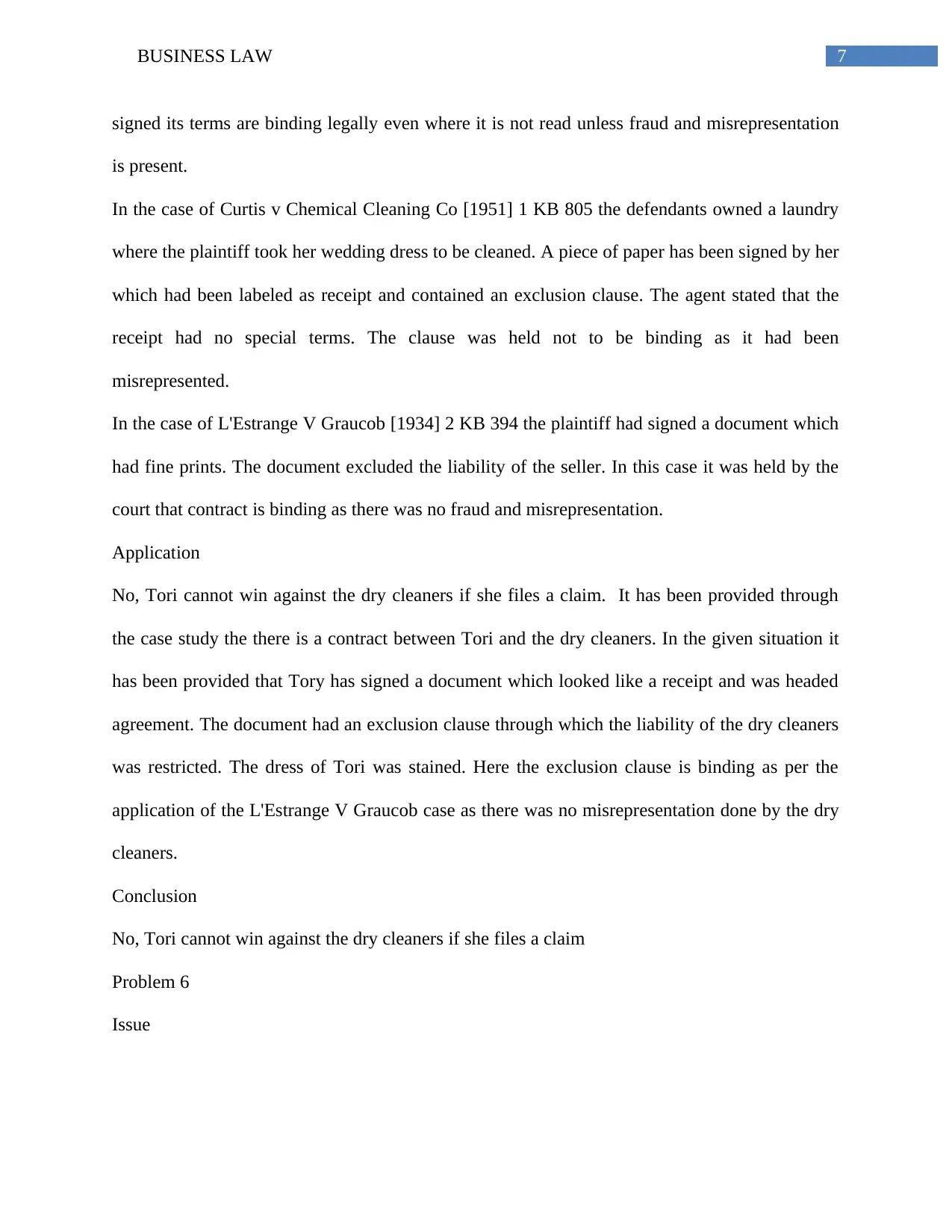
7BUSINESS LAW
signed its terms are binding legally even where it is not read unless fraud and misrepresentation
is present.
In the case of Curtis v Chemical Cleaning Co [1951] 1 KB 805 the defendants owned a laundry
where the plaintiff took her wedding dress to be cleaned. A piece of paper has been signed by her
which had been labeled as receipt and contained an exclusion clause. The agent stated that the
receipt had no special terms. The clause was held not to be binding as it had been
misrepresented.
In the case of L'Estrange V Graucob [1934] 2 KB 394 the plaintiff had signed a document which
had fine prints. The document excluded the liability of the seller. In this case it was held by the
court that contract is binding as there was no fraud and misrepresentation.
Application
No, Tori cannot win against the dry cleaners if she files a claim. It has been provided through
the case study the there is a contract between Tori and the dry cleaners. In the given situation it
has been provided that Tory has signed a document which looked like a receipt and was headed
agreement. The document had an exclusion clause through which the liability of the dry cleaners
was restricted. The dress of Tori was stained. Here the exclusion clause is binding as per the
application of the L'Estrange V Graucob case as there was no misrepresentation done by the dry
cleaners.
Conclusion
No, Tori cannot win against the dry cleaners if she files a claim
Problem 6
Issue
signed its terms are binding legally even where it is not read unless fraud and misrepresentation
is present.
In the case of Curtis v Chemical Cleaning Co [1951] 1 KB 805 the defendants owned a laundry
where the plaintiff took her wedding dress to be cleaned. A piece of paper has been signed by her
which had been labeled as receipt and contained an exclusion clause. The agent stated that the
receipt had no special terms. The clause was held not to be binding as it had been
misrepresented.
In the case of L'Estrange V Graucob [1934] 2 KB 394 the plaintiff had signed a document which
had fine prints. The document excluded the liability of the seller. In this case it was held by the
court that contract is binding as there was no fraud and misrepresentation.
Application
No, Tori cannot win against the dry cleaners if she files a claim. It has been provided through
the case study the there is a contract between Tori and the dry cleaners. In the given situation it
has been provided that Tory has signed a document which looked like a receipt and was headed
agreement. The document had an exclusion clause through which the liability of the dry cleaners
was restricted. The dress of Tori was stained. Here the exclusion clause is binding as per the
application of the L'Estrange V Graucob case as there was no misrepresentation done by the dry
cleaners.
Conclusion
No, Tori cannot win against the dry cleaners if she files a claim
Problem 6
Issue
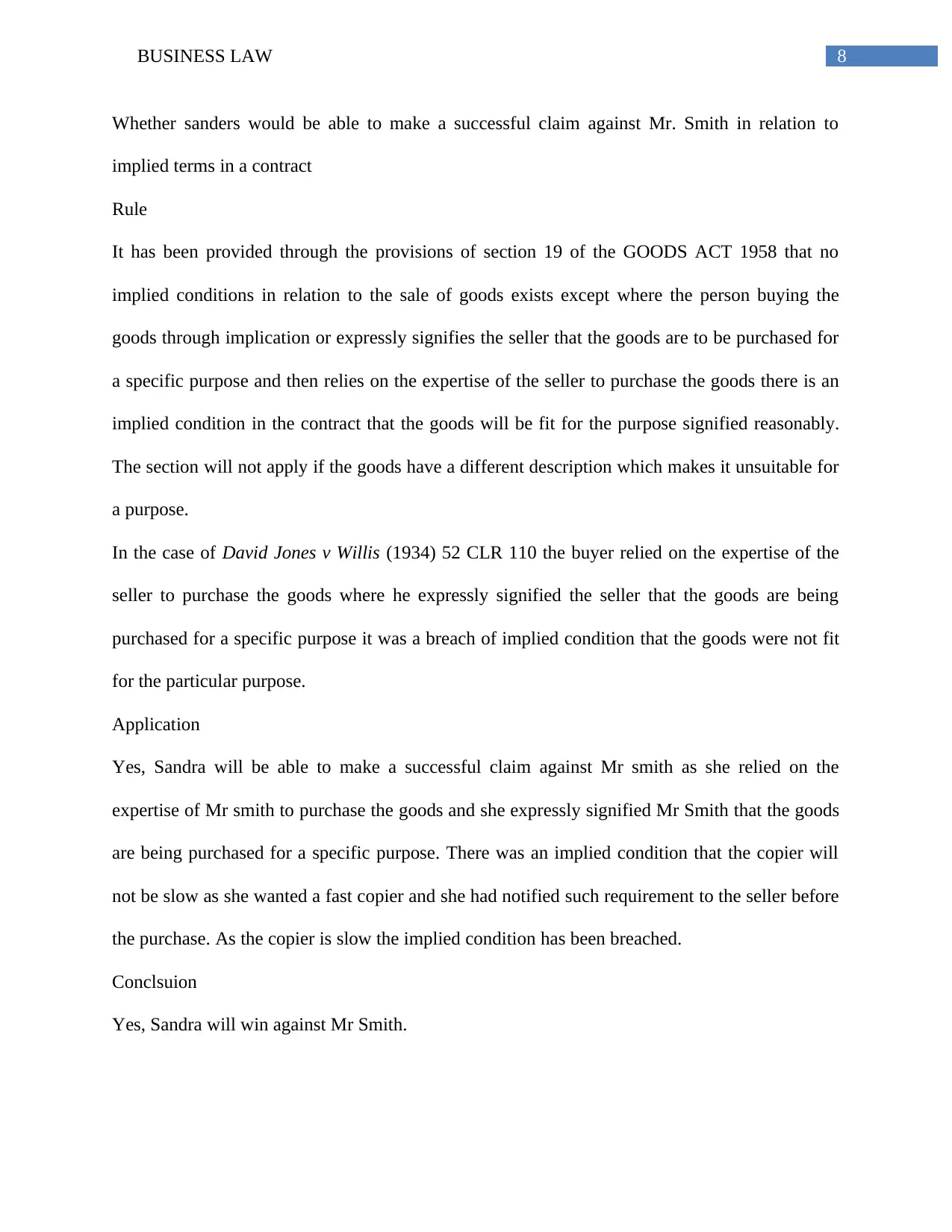
8BUSINESS LAW
Whether sanders would be able to make a successful claim against Mr. Smith in relation to
implied terms in a contract
Rule
It has been provided through the provisions of section 19 of the GOODS ACT 1958 that no
implied conditions in relation to the sale of goods exists except where the person buying the
goods through implication or expressly signifies the seller that the goods are to be purchased for
a specific purpose and then relies on the expertise of the seller to purchase the goods there is an
implied condition in the contract that the goods will be fit for the purpose signified reasonably.
The section will not apply if the goods have a different description which makes it unsuitable for
a purpose.
In the case of David Jones v Willis (1934) 52 CLR 110 the buyer relied on the expertise of the
seller to purchase the goods where he expressly signified the seller that the goods are being
purchased for a specific purpose it was a breach of implied condition that the goods were not fit
for the particular purpose.
Application
Yes, Sandra will be able to make a successful claim against Mr smith as she relied on the
expertise of Mr smith to purchase the goods and she expressly signified Mr Smith that the goods
are being purchased for a specific purpose. There was an implied condition that the copier will
not be slow as she wanted a fast copier and she had notified such requirement to the seller before
the purchase. As the copier is slow the implied condition has been breached.
Conclsuion
Yes, Sandra will win against Mr Smith.
Whether sanders would be able to make a successful claim against Mr. Smith in relation to
implied terms in a contract
Rule
It has been provided through the provisions of section 19 of the GOODS ACT 1958 that no
implied conditions in relation to the sale of goods exists except where the person buying the
goods through implication or expressly signifies the seller that the goods are to be purchased for
a specific purpose and then relies on the expertise of the seller to purchase the goods there is an
implied condition in the contract that the goods will be fit for the purpose signified reasonably.
The section will not apply if the goods have a different description which makes it unsuitable for
a purpose.
In the case of David Jones v Willis (1934) 52 CLR 110 the buyer relied on the expertise of the
seller to purchase the goods where he expressly signified the seller that the goods are being
purchased for a specific purpose it was a breach of implied condition that the goods were not fit
for the particular purpose.
Application
Yes, Sandra will be able to make a successful claim against Mr smith as she relied on the
expertise of Mr smith to purchase the goods and she expressly signified Mr Smith that the goods
are being purchased for a specific purpose. There was an implied condition that the copier will
not be slow as she wanted a fast copier and she had notified such requirement to the seller before
the purchase. As the copier is slow the implied condition has been breached.
Conclsuion
Yes, Sandra will win against Mr Smith.
⊘ This is a preview!⊘
Do you want full access?
Subscribe today to unlock all pages.

Trusted by 1+ million students worldwide
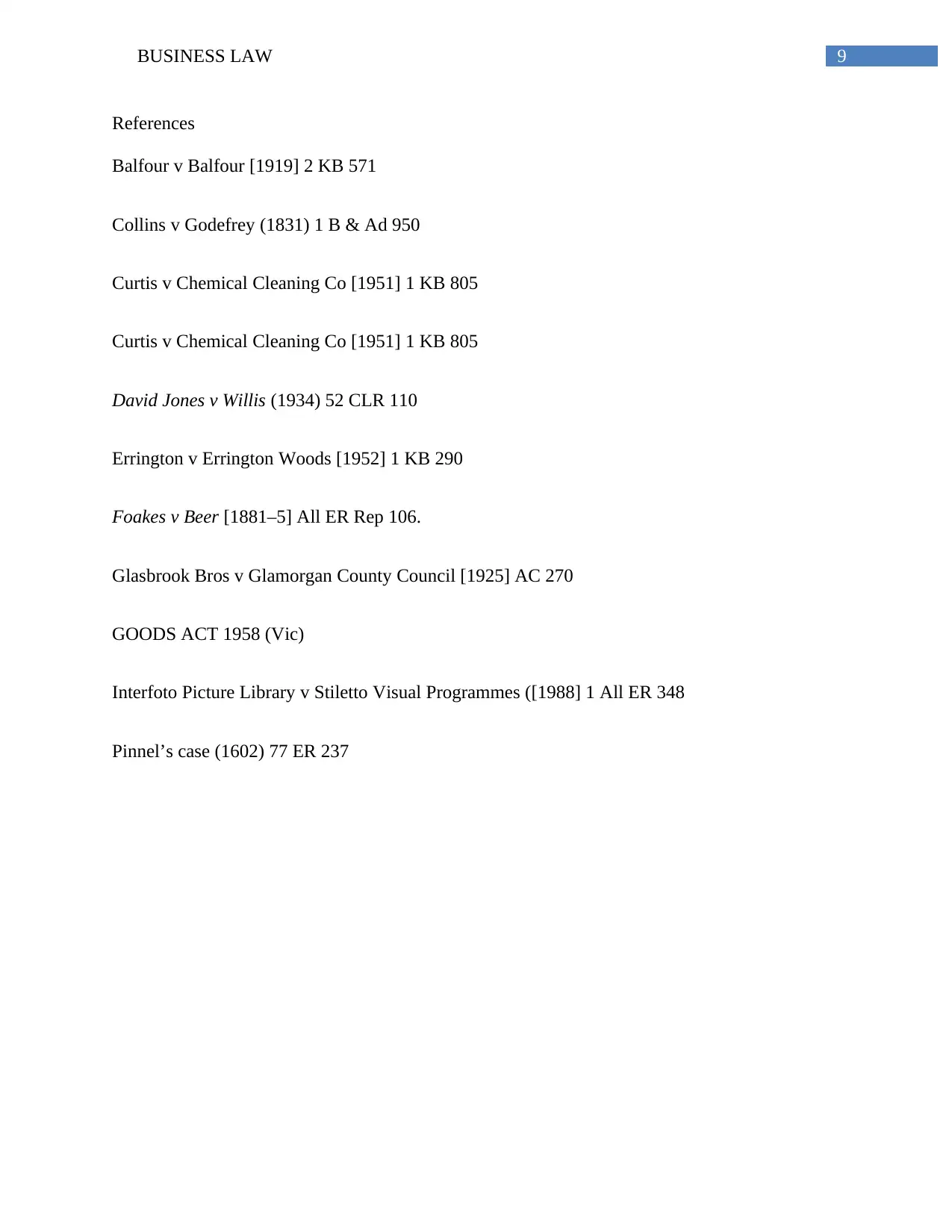
9BUSINESS LAW
References
Balfour v Balfour [1919] 2 KB 571
Collins v Godefrey (1831) 1 B & Ad 950
Curtis v Chemical Cleaning Co [1951] 1 KB 805
Curtis v Chemical Cleaning Co [1951] 1 KB 805
David Jones v Willis (1934) 52 CLR 110
Errington v Errington Woods [1952] 1 KB 290
Foakes v Beer [1881–5] All ER Rep 106.
Glasbrook Bros v Glamorgan County Council [1925] AC 270
GOODS ACT 1958 (Vic)
Interfoto Picture Library v Stiletto Visual Programmes ([1988] 1 All ER 348
Pinnel’s case (1602) 77 ER 237
References
Balfour v Balfour [1919] 2 KB 571
Collins v Godefrey (1831) 1 B & Ad 950
Curtis v Chemical Cleaning Co [1951] 1 KB 805
Curtis v Chemical Cleaning Co [1951] 1 KB 805
David Jones v Willis (1934) 52 CLR 110
Errington v Errington Woods [1952] 1 KB 290
Foakes v Beer [1881–5] All ER Rep 106.
Glasbrook Bros v Glamorgan County Council [1925] AC 270
GOODS ACT 1958 (Vic)
Interfoto Picture Library v Stiletto Visual Programmes ([1988] 1 All ER 348
Pinnel’s case (1602) 77 ER 237
1 out of 10
Related Documents
Your All-in-One AI-Powered Toolkit for Academic Success.
+13062052269
info@desklib.com
Available 24*7 on WhatsApp / Email
![[object Object]](/_next/static/media/star-bottom.7253800d.svg)
Unlock your academic potential
Copyright © 2020–2026 A2Z Services. All Rights Reserved. Developed and managed by ZUCOL.


